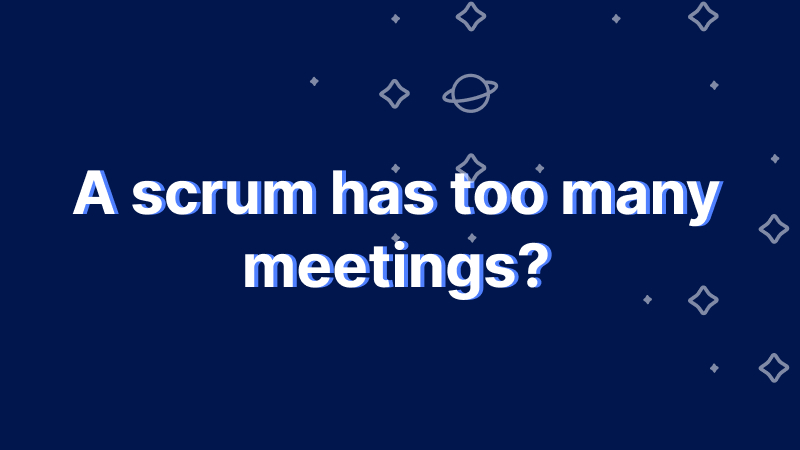Have you ever been in a meeting and thought “What a waste of time”? I have, and I am sure that I am not the only one. Some questions that might come to mind are:
- Why do we have non-sense meetings?
- Are they necessary?
- Do they solve future conversations?
Scrum, as an agile framework, establishes a set of meetings called events. This framework focuses on who should attend those events. Practically, it proposes that everyone that is involved in the project should attend.
This is something a bit hard to understand for those who are used to working with traditional methods, were decisions are made by few people in the top of the pyramid. Scrum, and agile, seek to break these kind of structures and invite everyone that is involved in a project, to have an active role. It is important to understand the purpose of each event the methodology proposes.
Scrum Events
- Sprint Planning → The entire team meets in order to plan and define what will be produced during the next iteration.
- Daily Scrum → Development team meets in order to have everyone in the loop and updated. It takes 15 minutes per day.
- Sprint Review → The entire team meets in order to check what has been done at the end of the iteration
- Sprint Retrospective → The entire team meets in order to understand what they are doing great and what they are doing wrong, and get actionable tasks to improve.
There are other events that the framework proposes but these are the ones that the Scrum guide tell us to perform in a specific routine.
Having worked on many projects, I am used to hear different things, such as the following:
- “This daily is not worth it”
- “Can I not attend this daily?”
- “A retrospective? Why? We already know what we do wrong”
- “Is it necessary to have everyone in the sprint review? Can’t we only have the product owner presenting it?”
- “This is too inefficient, I could be producing instead of being in this meeting”
When are meetings unnecessary?
It’s pretty normal feeling some meetings would be better not to attend.
To know if a meeting is unnecessary or not, what I would do is to think if it has a specific goal, an agenda of the topics to be discussed. Sometimes we feel we are in a meeting where it seems that there is no point of conclusion; don’t worry! As long as its goal is to get everyone’s perspectives in order to get different proposals for a next meeting, it’s perfect.
In my opinion, teams tend to have a lack of methodology and commitment to them. If they had it, they wouldn’t suffer (that much).
It is also normal having people feel they are wasting productive time. If we follow, for example, scrum events, and we are commited, we will have the required information in order to build things without mistakes, or misunderstandings, which would end up being much less efficient.
Which are the benefits of Scrum events?
Each event has a specific goal. Why are they so important?
Sprint planning →
Helps to define exactly what is expected of each feature. It aligns the expectations between the team and the client.
Daily scrum →
It enhance communication and aligns the development team and helps getting rid of roadblocks.
Sprint review →
Continuous deliveries help to understand whether we are building the right features in the right way or not. We test, we learn, we adapt.
Sprint retrospective →
To improve as a team, it is important to meet, be transparent, and say which things we did wrong, which we did right, and which someone didn’t like. If we didn’t stop for an hour every 2 weeks to talk about how we are doing, and to get actionable tasks to improve, we would be in automatic pilot and continuously making the same mistakes on and on.

Conclusion
There are things that are hard to explain, and they need to be experienced in first person to notice the difference. Some people rather remain sceptical of the benefits of agile methodologies.
What can we do about it? Well, first, I would not freak out. I would try to show them the benefits with empiricism. Each sprint you can build a sprint summary, and show the team how we are doing, which things we did better, and which things we did worse.
Once, I heard something I really liked and enhance me:
“Don’t be afraid of trying new things that might not work well. It can help you to get you out of your comfort zone, improve and innovate.”
And as I mentioned before, if we take events seriously with responsibility, communicate their goals transparently and implement clear dynamics, we will have results that we didn’t have till now.
If you enjoyed this post, or have an idea or are working on a project you could use some help with, feel free to contact us! We’d be happy to help you… or who knows? Maybe be your new partner in crime.
By: Gonzalo Amuchastegui Mayoral
If you have an idea or are working on a project you could use some help with, feel free to contact us! We’d be happy to help you… or who knows? Maybe be your new partner in crime.
You enjoyed this post and want to read more?
